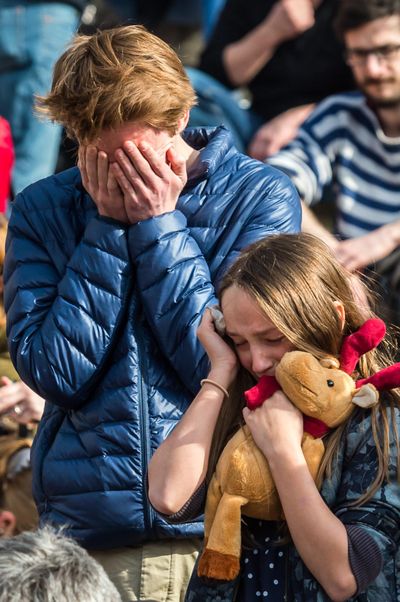Belgium charges 3 more attacks suspects for terror offenses

BRUSSELS – Belgian prosecutors announced Saturday they have charged three men with terror offenses over the suicide attacks on the Brussels airport and subway, as organizers canceled a solidarity rally at the government’s request because police are too strapped to cope.
At a news conference in Brussels, officials confirmed that 24 of the 31 people killed in the attacks Tuesday had been identified, and a doctor who had served in Afghanistan said he and his colleagues have been shocked by the extreme burns suffered by some of the 270 people wounded.
Federal prosecutors said a man identified as Faycal C., who was arrested Thursday, has been charged with “involvement in a terrorist group, terrorist murder and attempted terrorist murder.”
Belgian media say he is Faycal Cheffou, the man in the light vest and hat pictured on security video with two men who blew themselves up at the airport. Cheffou is described as a local activist known to police for trying to rally asylum-seekers and homeless people to radical Islam.
Prosecutors would not confirm the Belgian media reports. A police raid was conducted at his home but no arms or explosives were found, they said.
Two other suspects detained Thursday and identified as Raba N. and Aboubakar A. were charged with “involvement in the activities of a terrorist group.” In addition, a man named as Abderamane A. who was taken into custody on Friday after he was shot by police at a Brussels tram stop is being held for at least 24 more hours.
In Italy on Sunday, police said they arrested an Algerian wanted by Belgium for facilitating travel of illegal migrants in connection with the Nov. 13 attacks in Paris.
The suicide bombings during Tuesday’s peak morning travel time at the Brussels Airport and a city subway station killed 31 people, officials confirmed Saturday. That toll is likely to rise as some body parts have still not been identified, they said.
Brussels prosecutor Ine Van Wymersch told the Associated Press that 26 of the victims have now been identified. One was a former Belgian ambassador to the United States, Andre Adam.
A missing American couple were identified Saturday as victims of the attack. Justin Shults, 30, and his wife Stephanie Shults, had not been seen since Tuesday.
Her employer Mars, Inc., said in a Facebook post Saturday that her family had confirmed she and her husband died in the bombings.
Justin Shults, originally from Gatlinburg, Tennessee, and his wife, a Lexington, Kentucky, native, graduated together from Vanderbilt University’s Owen Graduate School of Management. They were dropping Stephanie’s mother off at the airport and were watching her walk through security when the bombs went off, a family member said.
Another woman killed in Tuesday’s bombing warned four months earlier that demonizing Muslims would help drive the recruitment of extremists.
Sascha Pinczowski posted on Facebook after the Nov. 13 Paris attacks that “Ignorant spreading of anti-Muslim sentiment and propaganda does nothing but benefit ISIS.”
The 26-year-old Pinczowski was a Dutch citizen living in New York. Her brother, Alexander, was also killed.
Pinczowski’s Nov. 16 Facebook post was reposted by her mother, Marjan Pinczowski Fasbender, who wrote that she wanted to share “this message of tolerance from our Dear Daughter Sascha.”
Of the 270 wounded, 93 are being treated at a Brussels military hospital. A doctor there said Saturday that 15 people are in a serious burns unit.
Dr. Serge Jennes said he had treated similar injuries during his service in Kandahar, in southern Afghanistan, but said he and his colleagues were shocked to see such injuries on women and children.
“I’ve never seen this before in my 20 years at the center for burns,” Jennes said. “Injuries linked to the blowback from the blast, which can mutilate.”
He said almost all the wounded had burst eardrums and added that his colleagues are likely to need psychological counseling to help cope with what they had witnessed.
In a sign of the tensions in the Belgian capital and the way security services are stretched across the country, Belgium’s interior minister appealed to residents not to march Sunday in Brussels in solidarity with the victims.
“We understand fully the emotions,” Interior Minister Jan Jambon told reporters. “We understand that everyone wants to express these feelings.”
But, he said, “we invite the citizens not to have this demonstration.”
Organizers quickly granted his request, postponing the march.
Brussels airport officials, meanwhile, began to assess the damage caused by twin explosions at the Zaventem departure terminal.
Authorities have wrapped up their investigation of the crime scene at the airport, and engineers were let in to check the building’s structural safety and information technology systems – and to see whether any damage can be repaired quickly.
Brussels Airport, which handles 23.5 million passengers annually, said it would be Tuesday at the earliest before flights resume.
The transport disruptions will do little to ease the worries of jittery Europeans, who are wondering how many violent extremists remain at large, and where and when they might strike again.
Authorities believe both the Brussels attacks and the Nov. 13 bombings in Paris that killed 130 people were plotted from Belgium.